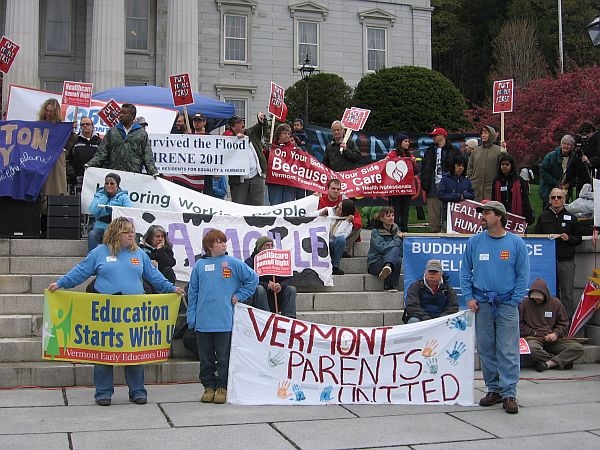
The drummers were warming up as marchers gathered in front of Montpelier’s City Hall Tuesday for a May Day rally that focused on universal health care and workers’ rights.
Anna Gebhardt was part of the procession. She’s a longtime early childhood educator who is now helping to organize a union to represent child care workers.
"We are the experts on child care. Decisions are made every day that affect our ability to care for the children and families that we serve," Gebhardt says. "And we need to be sitting at that table to ensure that those decisions are made most efficiently, most effectively."
Gebhardt wants the Legislature to allow a union to bargain with the state for higher state reimbursements. The rally was especially timely for the organizers, whose efforts face an uncertain future in the waning days of the legislative session.
Gebhardt says allowing a union to negotiate with the state would help both the workers and parents, who need the state subsidies to pay for quality care.
"Many parents are commuting over an hour each way to work. They’re leaving their children up to 10 hours a day in child care. They just don’t have the money to support how much it costs to provide high quality child care," she says. "And the subsidy rates have not been rising with the actual cost."
As the marchers streamed out on to the street for the three block walk to the Statehouse, they paraded by Windsor Senator John Campbell who was out on his lunch break. Campbell is the Senate President and he opposes the union effort. He says he supports the right of anybody to organize but he says he’s worried about the cost to the state.
"It’s not organized labor or collective bargaining that I oppose by any means," Campbell says. "It’s the fact is, what kind of fiscal impact will this have on the state in the future if we just collectively bargain with everybody who does work with the state."
Chittenden Senator Philip Baruth was part of the workers rally. Baruth opposes Campbell on the child care union issue. And he isn’t worried about the financial impact on the state of allowing the union to organize.
"I’m part of a union at UVM and we were told that when we were getting ready to organize that it would bankrupt the university, that it would sever us from the management class and the medical school," he says. "All that’s happened, if you look over the last 10 years, is that people’s quality of life has been strengthened and with it more generally the middle class. So that’s I think is the goal, to get child care workers into the middle class and keep them there."
Both the House and the Senate have passed versions of a child care union bill. But they contain very different provisions and they’re in different underlying bills.
So reconciling the differences between the two chambers may be challenging this late in the session, especially when the Senate leader is not supportive.